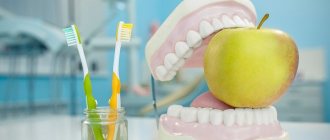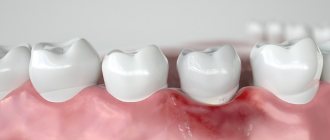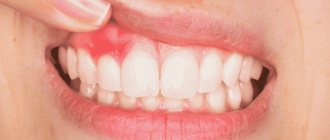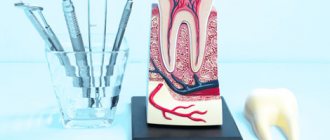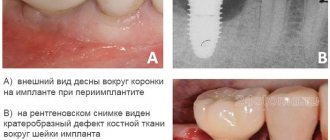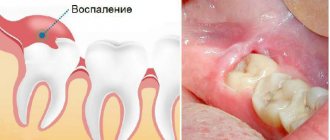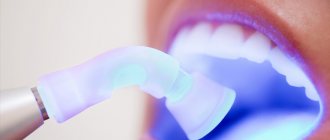How dangerous is this?
A tooth is not a completely foreign body. This is a part of the victim’s body, which is also small and does not have serious dangerous properties such as toxicity. No human tooth is large enough to cause significant problems if it enters the stomach and esophagus.
It is very difficult to swallow the entire jaw
If you swallowed a tooth, you know about it, but you don’t feel it anywhere above your stomach, then there is nothing to worry about - it has already reached the center of the digestive system and will come out naturally over time. Danger occurs when a tooth gets stuck in the esophagus. It doesn’t matter whether it’s a solid tooth or a splinter, there is a high probability that it will have sharp edges. They are too small to seriously damage the mucous membrane of the throat, but they can cause panic and suffocation in sensitive people. It is not easy to push a tooth further out of the esophagus if it is stuck - those who have experienced such trouble associate their sensations with a fish bone stuck in the throat, only smaller.
Why is inflammation of the esophageal mucosa dangerous during such an injury?
Any foreign object is perceived by the body as a threat. Its natural reaction to damage to the mucous membrane is inflammation. An inflammatory shaft forms around the foreign object, and then suppuration develops. Prolonged presence of a foreign object in the esophagus area leads to an increase in body temperature, the development of fever and intoxication, and increased pain. Needles and pins are able to migrate to other organs of the digestive tract. Often, against the background of the inflammatory process and necrotic changes, esophageal-tracheal fistulas, phlegmon, pneumothorax and even emphysema are formed. If large vascular trunks are damaged, bloody vomiting and profuse bleeding may develop.
What can be done and what should not be done?
It is difficult for the victim himself to assess how deeply the tooth has sunk. Independent attempts to remove it from the esophagus will lead to a gag reflex and, possibly, new damage to the oral cavity.
What not to do:
- Trying to reach the tooth with your fingers and especially with foreign objects
- Panic and try to “cough up” the interfering object
- Do nothing and hush up the problem, expecting it to go away on its own
Examine the gums if possible. If a tooth has fallen out or crumbled, then you should know what condition it was in in the near future. A small analysis will help you understand how big the chip is now in your throat; careful palpation of the gums from below will help you determine whether the root remains inside.
If there is no sensation of pain in the larynx or esophagus, then the natural way of exiting the swallowed tooth is most likely and there is no reason for concern
With all this information, go to your dentist or immediately to a traumatologist if you have difficulty breathing. The specialist will tell you what to do now, and at the same time will diagnose other teeth, warning of possible danger.
If a crown or filling is swallowed
Fillings with sharp edges carry the same potential danger to the esophageal mucosa as teeth, but they are much smaller in volume. Fillings may also not fall off completely, but rather break off into small fragments that pose almost no danger.
A swallowed crown will not cause any harm in itself, but you should visit the dentist as soon as possible to protect the remaining tooth without a crown.
The crowns are also small in size and if they get into the esophagus and further, they will not cause harm (except for possible micro-scratches). If a filling or crown falls out, you need to immediately fix this problem by installing a new one, even if the tooth does not hurt or bother you in any way. Open dental canals and healthy parts of the tooth will begin to deteriorate after a few weeks from eating food or hot liquids. Due to delay, there may be a need to completely re-treat the tooth.
Binge eating
This mistake is made by people who are not familiar with the structure of the digestive system. The only option when this solution can be partially correct is that the tooth is stuck at the end of the esophagus and you feel it somewhere above the stomach.
You can eat a small piece of black bread (white is more sticky), fruit or vegetable (preferably with a dense consistency). If after this the sensations do not change in any way, try again in half an hour. You can drink water.
In addition, a swallowed crown or other metal element of dental corrective structures will not be visible on an x-ray due to the large amount of food in the stomach and waste in the intestines.
Professional treatment
Of course, a quick response and timely treatment will guarantee the patient’s full recovery. The slightest delay can lead to a person requiring a long period of rehabilitation. Depending on the complaints, the doctor determines the optimal examination method; most often, X-ray or ultrasound is used.
Quite often, laxatives demonstrate an excellent effect; they speed up the process of removing the part from the body. In this case, the person does not feel discomfort or pain and lives a normal life. If the arc accidentally gets into the respiratory organs, it is more advisable to prescribe an auscultation procedure. It consists of listening to the lungs and other internal organs and allows you to identify disturbances in their functioning with maximum accuracy.
Sometimes professionals put the patient into medicated sleep, this allows the bronchoscopy procedure to be performed with less inconvenience. This is especially true with a strongly expressed gag reflex. Due to the urge, a person may move, which is extremely undesirable and can interfere with the careful work of the doctor. Do not underestimate the seriousness of the problem, because even a small piece of metal can lead to serious problems. A quick response will save a person’s health and sometimes life.
previous post
Turnkey dental implantation how it happens
next entry
Are there medications that will improve the situation?
There are no solutions aimed at solving this specific problem. Such medications are not sold because the problem is not significant and will soon resolve itself or with minimal help from doctors.
Dehydration, stopping the healthy digestive process, pain, loss of appetite - all these symptoms can appear if you take the drug without appropriate indications.
If the tooth is severely stuck and scratched, no medications will help - go to the emergency room, where foreign objects are pulled out of the esophagus every day. This can only be done by a professional physician who knows how the esophagus works and will not damage it. If you don’t want to wait in line at the clinic and search for the right office, you can find a private dental office - usually there is at least one of these in every area.
Prevention
- A healthy lifestyle and daily oral care using personal hygiene products will help prevent the development of gumboil. For cleaning, use a medium-hard brush.
- After each meal, it is recommended to rinse your mouth with a special mouthwash or use dental floss. Instead of a pharmaceutical composition, it is allowed to use an aqueous solution of food salt, sea salt or an alcoholic tincture of propolis.
- Do not use non-sterile objects as toothpicks. Such actions lead to mechanical injuries and infection.
- Periodic professional dental cleaning helps remove stone, which provokes the development of inflammation of the gums with pus.
- The daily diet must be supplemented with fresh vegetables and fruits. Apples, carrots and other solid plant foods cleanse plaque from enamel and strengthen teeth.
It is also important to treat dental defects immediately and undergo regular clinical examinations at least twice a year. It is much easier to prevent dental disease than to treat its negative consequences. You should be attentive to your health and not ignore the warning signals that your body gives.
Read also: Why do we need electronic textbooks?
What to do if a child swallows a tooth?
Children are the ones who swallow teeth most often - they chew faster, are in a hurry and know little about handling sick and weak teeth. A parent may not know for a long time that a child’s molar is weak or crumbling; children often hide such information in order to delay a visit to the dentist.
It is better to explain to the child in advance that there will be many more teeth that fall out and you should handle them more carefully. A tooth scratching the throat will cause a baby much more anxiety than an adult - he may start crying, unable to get rid of the irritant.
What to do with a child with such a complaint?
- Call the children's clinic and ask the regular dentist's office hours (in extreme cases, a traumatologist, ENT specialist, or even a surgeon will do)
- There is no need to call an ambulance (only if the child is choking - then there is a tooth in the windpipe)
- Calm the child down, give him something to drink and take a light meal with him, giving him a piece in case it helps.
- If clinics are not open, find the nearest private dental office - they will quickly and most likely solve the problem for free
There is no need to panic - tell your child directly that nothing terrible is happening and the problem can be easily solved.
What happens if you accidentally swallow a tooth?
There are different situations in life, and none of us is immune from everything in the world. Many of us have, at least once, accidentally and carelessly swallowed chewing gum, bones and other products not intended for human consumption. But what should a person who has swallowed his own tooth, implant, filling or crown do?
Children sometimes swallow fallen baby teeth
Why did the crown fall off?
Most often, the process of swallowing is invisible; a person understands this only after finishing the meal and the absence of an artificial tooth. Usually the cause is the consumption of solid foods, for example, the process of chewing tough meat. If the problem occurs shortly after dental prosthetics, the reason is poor-quality installation and unreliable fixation of the crown. The second option is that the crown fell off after a long time. Most likely, the prosthesis has expired, so the artificial material could not withstand the next load.
What measures should be taken and what should not be taken?
Extra precaution never hurts. Let's figure out what you need to do if you are unlucky enough to swallow your own tooth, and what you should never do.
First precautions if you swallow a tooth
First, determine whether it was a piece of tooth or the entire tooth. In the first case, the hypothetical danger is directly proportional to the size of this piece. Also determine the shape of the chip. It often happens that the broken pieces have sharp edges or corners. If this is your case, then you will have to visit a traumatologist who will help you deal with the swallowed part of the tooth. If the remaining part of the tooth also has sharp edges, then visit a dentist who can process these edges.
A knocked out tooth can be accidentally swallowed
What if you swallowed a tooth whole? In this case, you should contact your dentist.
He will conduct an examination and give his recommendations for oral care. This should help you avoid similar troubles in the future. A visit to a traumatologist is not necessary and is only needed if your condition causes you concern. The tooth will come out on its own after some time.
If you swallow a filling or crown
If you have swallowed a filling, then a visit to your dentist is required, as it is very important to determine the composition of the filling. Fillings installed in different clinics have different compositions, so you will need to find out whether their components pose a danger if swallowed. If this is the case, then you will need to see a gastroenterologist as soon as possible.
Folk remedies
The effectiveness of treatment depends on proper diagnosis and strict adherence to medical prescriptions. Dentists at the Dentika clinic are able to correctly diagnose the problem and correctly select therapy. It is worth remembering that any disease is easily eliminated at the initial stage.
If it is not possible to immediately visit a doctor for dental diseases, the use of traditional medicine methods is allowed.
Pus under a tooth or above the gum can be an independent disease or signal the development of periodontitis or gingivitis. These are serious pathologies that do not go away on their own.
The use of antiseptic rinses helps to temporarily relieve inflammation:
- You can dissolve a teaspoon of soda, table salt or two furatsilin tablets in 200 ml of water.
- 3% hydrogen peroxide solution and warm water in a 50/50 ratio.
- Chamomile decoction. Two tablespoons of the plant are poured with boiling water and allowed to brew.
- Miramistin or chlorhexidine biglucanate solution.
The key manifestation of the disease is pain. Taking analgesics will help ease the wait for a medical consultation.
For applications, use an aloe leaf cut in half.
Is it possible to do without doctors?
The decision is yours: seek qualified help or try to solve the problem yourself. Despite the fact that your own strength may well be enough, you cannot treat this without due attention. Of course, in the absence of any negative symptoms, you will want to simply forget about the trouble, but no one has ever suffered from being too careful. If you have the opportunity, be sure to contact a specialist.
The crown may fall out if it is heavily loaded
We have figured out what measures should be taken. But what is absolutely forbidden to do?
Dentist appointment
Now let's move on to the question of the aesthetics of a smile. Even if the crown has not completely fallen off, it still needs to be replaced with a new one. We advise you to contact a trusted dentist to ensure that the prosthesis is securely fixed. For maximum reliability, we recommend giving preference to higher quality materials, such as ceramics or cermets. Plastic is a budget option, but the service life and reliability of fastening leave much to be desired.
To prevent such situations, we recommend visiting the dentist every six months. In this case, there is a chance that the doctor will promptly notice the unreliable fixation of the artificial tooth and prevent further problems. Also pay attention to the service life of the crown. If it is designed for 5 years, after the period has passed, you need to see a specialist and take an impression to make a new prosthesis.
Basic mistakes of self-medication
Is vomiting the solution?
What would be the first solution that came to your mind? It is likely that you will want to get rid of the swallowed tooth. If the “wait until it comes out on its own” method still has a right to exist, then the “two fingers in the mouth” method is the worst thing you can come up with.
Vomiting is the last decision you should make in any situation.
It is permissible only in cases where delay in cleansing the intestines can cause irreparable consequences. This happens when ingesting chemicals and other substances that are not intended for this purpose, but not when swallowing solid objects.
It is better not to swallow amalgam fillings - they contain mercury
Why you shouldn't induce vomiting
Whether it is a tooth, a nail or a bone, you should not induce vomiting. On its way back, the tooth will be in active contact with the walls of the stomach, esophagus and pharynx. Physical damage to these organs can be quite dangerous. They can become hotbeds of infection, leading to much more unpleasant consequences than minor abdominal discomfort. So, do not induce vomiting under any circumstances.
A hearty lunch as a solution to the problem
Your other solution may be to try to “soften” the passage of the tooth by drinking plenty of water or food. Such a decision will make sense if you act wisely and without fanaticism. You should not eat foods that tend to linger in the body. In this case, your tooth will be delayed along with them. Better eat some fruit or drink water. Of course, all this should only be done if you do not have the opportunity to see a doctor. In this case, any food eaten will only interfere with your examination. Instead of a tooth, the doctor will see only your hearty lunch under the x-ray.
Fruits will help you get rid of a swallowed tooth faster
Tip #1: Don't panic
Often people can involuntarily swallow a fragment of the crown while eating, while chewing it, for example, with meat or even with tomatoes (i.e. with soft food), or trouble can happen in their sleep. If such a situation occurs in your life, then try not to panic. Indeed, in most cases this is not fraught with serious complications. Modern artificial crowns and dentures are made of safe and hypoallergenic materials, i.e. At least you won’t get poisoned, and your body won’t become intoxicated. If you swallowed the crown part of a natural decayed tooth that broke off, then the situation is similar.
It is important not to panic if the product is swallowed
“In general, such an unpleasant situation can only happen in a few cases. For example, if the service life of the prosthesis itself and the cement with which it was secured has expired, i.e. the structure simply disintegrated. Or the doctor initially used low-quality materials and adhesives for fixation in his work. This often happens with temporary structures that are not intended for cement fixation and long-term use. Well, sometimes the reason may lie in the fact that the patient himself puts an unbearable and completely inadequate load on a natural or artificial tooth; he likes to chew nuts, crackers, and open bottles. Also, the cause can be any injury received during an accident, a fall, a fight, or playing dangerous sports,” says Ambalova E.I., dental therapist, orthopedist.
Are there any medications or other remedies
You should also not take any medications or drugs designed to speed up the emptying of food from the stomach. Extra irritants will not bring any benefit. You should also not try to get rid of a tooth with carbonated drinks. They will only further damage the teeth still left in your mouth. Take care of them so as not to encounter the problem indicated above again.
And most importantly, don’t panic. There is nothing wrong with swallowing a small foreign object as long as it does not have sharp edges and is not dangerous in itself. Your health will not be endangered if timely measures are taken and qualified assistance from a specialist.
Ingested temporary fillings containing arsenic must be neutralized
How long is it temporary?
The period for installing such a filling depends on the purpose and clinical situation. It can range from 3 days to several months. If the doctor uses arsenic-based paste, then further treatment is carried out after 3-5 days, a maximum of a week. You cannot walk with arsenic in your tooth for any longer, as it can not only kill the nerve, but also destroy healthy tissue.
If the material used is necessary to protect against food and bacteria getting inside the canals during their sanitation or treatment of inflammation, it can remain in the tooth for several weeks. For longer treatments, the dentist may replace temporary fillings if a new dose of medication becomes necessary.
If your child swallows a tooth
Children generally tend to eat various small objects. And teeth are no exception. A child may accidentally swallow a lost baby tooth and there is usually nothing wrong with this. The tooth will come out on its own after a while along with the rest of the food. If the current situation causes concern for you or your child, then contact your pediatrician, who will perform a full examination of the child and give you further instructions.
Baby teeth are harmless and are even dissolved by gastric juice
If we briefly describe the action plan, it will look something like this:
- establish the nature of the swallowed object;
- examine the child’s mouth for bleeding or tooth debris;
- if the child’s condition does not cause concern, then doctor intervention is not necessary;
- if the child has a fever or other symptoms appear, you should consult a doctor;
- The doctor, in turn, can either give instructions over the phone or ask you to bring your child to the appointment.

